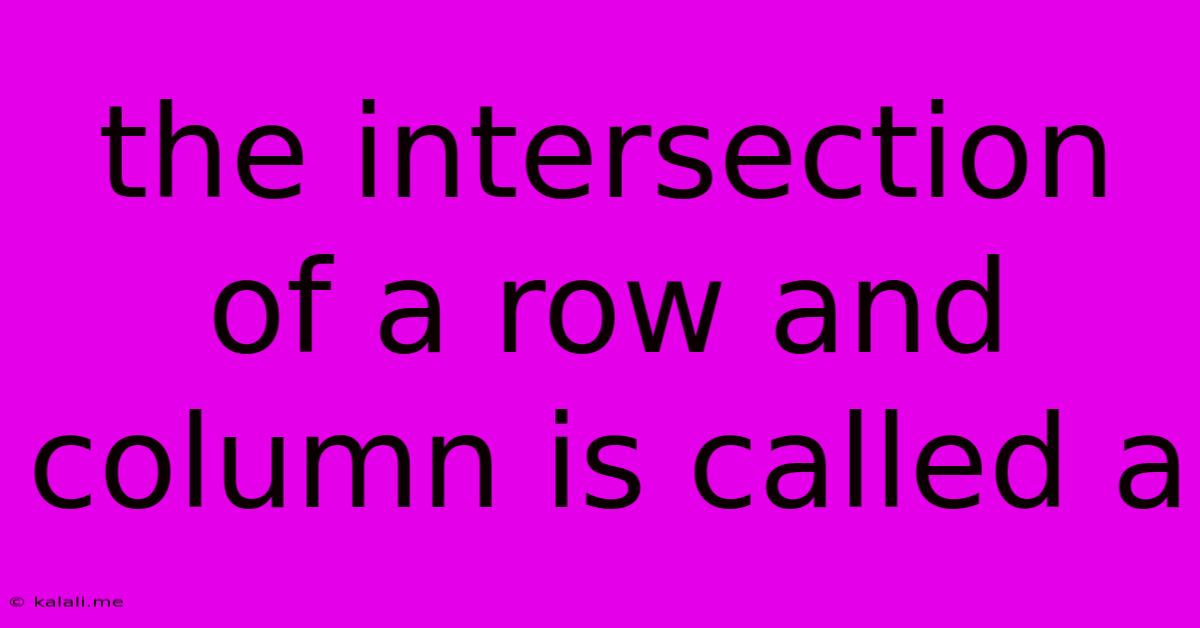The Intersection Of A Row And Column Is Called A
Kalali
Jun 13, 2025 · 3 min read

Table of Contents
The Intersection of a Row and Column is Called a Cell
The simple question, "The intersection of a row and column is called a...?" has a straightforward answer: a cell. This seemingly basic concept is fundamental to understanding data organization and is crucial in various fields, from spreadsheets to databases and even programming. This article will delve deeper into the significance of cells, exploring their role in different contexts and highlighting their importance in data management.
Understanding the concept of a cell requires us to visualize a structured data format. Think of a table – whether it's a spreadsheet in Excel, a database table in SQL, or even a simple HTML table on a webpage. This table is composed of horizontal rows and vertical columns. The point where a row and column intersect is precisely what we define as a cell. Each cell holds a single piece of data, be it a number, text, formula, or even a more complex data structure.
Cells in Spreadsheets
In spreadsheet applications like Microsoft Excel or Google Sheets, cells are the building blocks of your entire worksheet. Each cell is identified by a unique address, usually a combination of a column letter (e.g., A, B, C) and a row number (e.g., 1, 2, 3). For example, the cell at the intersection of column A and row 1 is referred to as cell A1. You can input data directly into these cells, perform calculations using formulas referencing other cells, and format the data within each cell to improve readability and presentation. The functionality provided by cells is at the heart of spreadsheet power and efficiency. Think of data analysis, budgeting, forecasting, or any number of other tasks – they all rely heavily on the effective use of cells.
Cells in Databases
The concept of a cell extends beyond spreadsheets. In relational databases, a cell represents a single data entry within a table. Each table is structured with rows representing records and columns representing attributes. The intersection of a row (record) and a column (attribute) forms a cell that holds a single value for that specific attribute in that particular record. For instance, in a database table for customers, a cell might contain a customer's name, address, or phone number. The efficient organization of data into rows, columns, and cells is essential for database management systems (DBMS) to perform queries and retrieve information effectively. This structure allows for easy sorting, filtering, and retrieval of specific data points, making database systems powerful tools for data management.
Cells in Programming and Data Structures
The concept of a cell is also relevant in programming and data structures. Two-dimensional arrays, for example, are essentially tables where each element (the data within) occupies a specific cell defined by its row and column index. This fundamental data structure is used extensively in programming for various applications, including image processing, game development, and simulations. The precise location and addressing of cells within an array are crucial for accessing and manipulating data. Efficient memory allocation and data retrieval often depend on this cell-based organization within an array or matrix.
In conclusion, the intersection of a row and column is unequivocally called a cell. This seemingly simple element plays a crucial role in various applications and fields. Understanding the concept of a cell is essential for anyone working with data, spreadsheets, databases, or programming. The organizational power and functionality derived from this simple intersection are the cornerstones of efficient data management and manipulation.
Latest Posts
Latest Posts
-
Router Works At Which Layer Of Osi Model
Jun 14, 2025
-
What Is The Lightest Element In The Periodic Table
Jun 14, 2025
-
Compute The Mass Fractions Of Ferrite And Cementite In Pearlite
Jun 14, 2025
-
What Is The Factor Of 23
Jun 14, 2025
-
Johnson C Smith University Gpa Requirements
Jun 14, 2025
Related Post
Thank you for visiting our website which covers about The Intersection Of A Row And Column Is Called A . We hope the information provided has been useful to you. Feel free to contact us if you have any questions or need further assistance. See you next time and don't miss to bookmark.